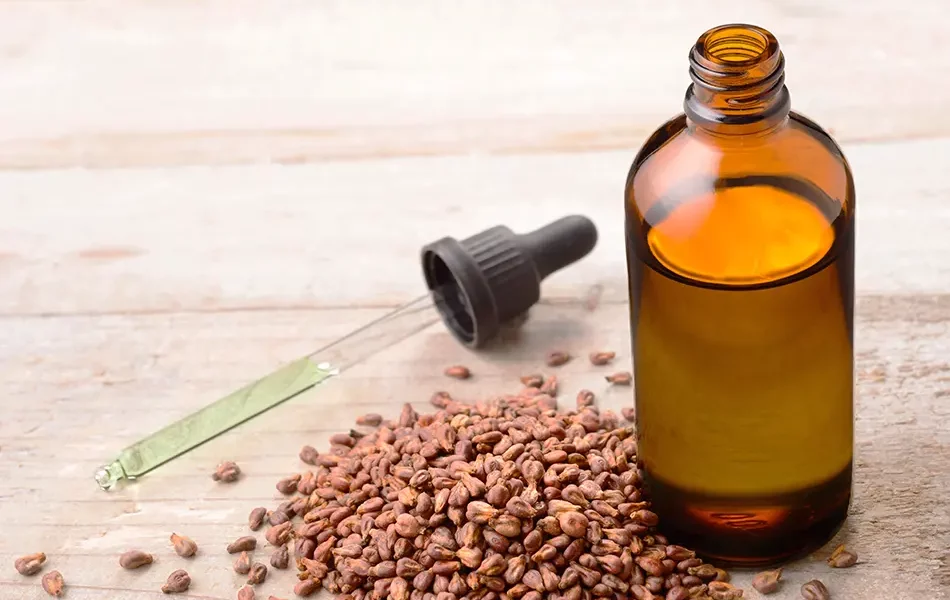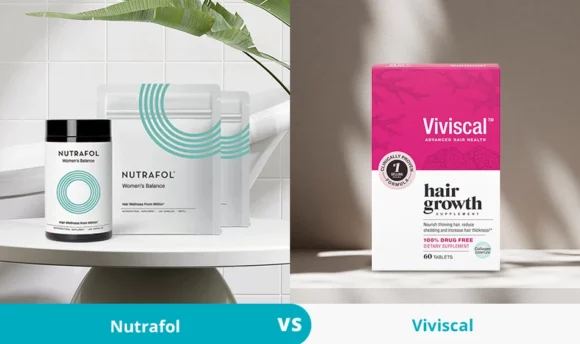16 Best Carrier Oils for Hair Growth: Unlocking the Power of Plants
Discover the best carrier oils to nourish your hair and promote healthy growth. From jojoba to avocado, come along for the ride through the benefits of each oil and how to use them in your daily routine.

Carrier oils have many benefits for hair. They are quickly absorbed by the scalp and can help deliver nutrients and ingredients evenly. They can relieve dandruff, add shine to dull hair, repair damaged hair, and protect hair from heat styling tools.
There are many different types of carrier oils on the market. This can be confusing, especially since different carrier oils have different benefits for hair, and everyone has unique hair needs.
Learn about the best carrier oils for haircare. Discover how they benefit your hair and scalp and how to choose the suitable oils for you based on your specific needs. Plus, learn how to use carrier oils to make DIY haircare products.
What’s the Best Carrier Oil for Hair Growth?
The best carrier oil for hair growth should be high quality, gently processed, organic, and all-natural, without chemical or non-natural elements or additives such as perfumes or chemicals. These oils retain their natural levels of vitamins, minerals, and antioxidants.
A carrier oil should also have beneficial properties that can improve your scalp health, prevent hair loss and promote hair growth with naturally occurring vitamins, minerals, and antioxidants that protect and keep the scalp healthy.
There’s a wide variety of carrier oils to choose from, and each may serve slightly different purposes and be more appropriate for you at different stages and occasions in your life.
What Are Carrier Oils?
Carrier oils are oils that transport additional substances into the skin. They usually come from vegetable or nut oils, but a few are derived from animals. Emu oil is a popular animal carrier oil.
Because most carrier oils for haircare are inexpensive, they are often used to transport more expensive substances like essential oils.
Many individuals obtain these oils by cold pressing. This method involves pressing or crushing a plant without heating it. This minimum processing can aid in the preservation of bioactive compounds in oils.
Carrier Oils vs. Essential Oils
Carrier oils and essential oils are derived from plants. Carrier oils dissolve essential oils and “carry” them to your skin. Because essential oils are potent, they can be irritating to the skin when applied directly.
Most carrier oils are unscented or mildly scented and do not interfere with the therapeutic effects of essential oils. They can be used alone or with other oils to nourish the skin.
While carrier oils are beneficial, they become even more powerful when blended with essential oils. Not only do they have a number of unique benefits, but they can also make your hair smell and feel richer.
Benefits of Carrier Oils for Hair
Carrier oils can offer many benefits for hair health. With regular use of carrier oils, you can enjoy stronger, healthier locks with more shine. Here’s why you should include them in your daily haircare routine.
- Moisturization: Carrier oils aid in the moisturization of the hair and scalp, which is necessary for healthy hair growth. A dry, flaky scalp can cause hair breakage and limit hair growth.
- Delivery of nutrients: Carrier oils are easily absorbed by the skin, making it easier to supply their rich vitamins and minerals to nourish the scalp and hair, improving hair development.
- Scalp health: Carrier oils can help improve scalp health by moisturizing the skin and promoting blood flow to the scalp. This can help reduce dandruff, itchiness, and other scalp conditions.
- Hair growth: Some carrier oils, such as castor and coconut oil, have been shown to promote hair growth. They can help strengthen hair follicles and prevent breakage, leading to longer and thicker hair.
Top 16 Carrier Oils for Hair Growth: What They Do and How to Use Them
#1 Apricot oil
Apricot oil is extracted from apricot kernels, and it is well-known for its light and non-greasy property, making it an excellent choice for people with oily scalps.
It’s high in vitamins A, C, and E, potassium, and fatty acids, which can nourish and promote healthy scalp and hair growth. It’s also high in antioxidants and moisturizes the hair shaft, which can help keep hair from environmental damage and treat alopecia.
Apricot oil also contains oleic and linoleic acids, which soften, manage, and encourage hair growth while preventing moisture loss. You can apply it to your scalp and hair or combine it with other carrier oils like avocado or coconut oil.
Massage the mixture into your hair and scalp for 15–30 minutes, then rinse with warm water and gentle shampoo.
#2 Argan oil
Argan oil for hair is derived from the fresh kernels of the argan tree, which grows in Morocco. The oil contains antioxidants, such as vitamin E and fatty acids, which add a fatty layer to your scalp and hair, reducing frizziness, preventing dryness, and increasing shine.
The oil has oleic and linoleic acid properties that help lubricate the hair shaft end and stabilize the moisture content. Argan oil also absorbs quickly into the hair and hydrates all the dry cracks.
Apply a few drops to your palms and rub your hair, focusing on the ends. You can also mix coconut or lavender essential oil for added benefits. Allow it to sit on your hair for 30 minutes to an hour before washing it as usual.
#3 Avocado oil
One of the most lightweight carrier oils, avocado oil, is made from the flesh of avocado fruit. It contains vitamins A, D, and E, minerals, and antioxidants that benefit hair and scalp. Avocado oil is also rich in monounsaturated fatty acids, which help strengthen the hair shaft, reduce breakage, and promote hair development.
Massage your scalp with avocado oil and lavender essential oil to increase blood flow to your hair follicles and boost new hair growth.
#4 Black seed oil
Also known as black cumin seed oil or Nigella sativa oil, the black seed oil is high in fatty acids, such as linoleic and oleic acid, as well as antioxidants and anti-inflammatory chemicals. These nutrients nourish the scalp and hair, promoting healthy hair growth and avoiding hair loss.
This oil can also help strengthen the hair shaft, prevent breakage, and hydrate the hair and scalp, making it an excellent oil for people with dry and brittle hair.
Black seed oil is also high in thymoquinone, a substance with anti-inflammatory and antioxidant properties, helpful in soothing an itchy scalp while encouraging healthy hair growth.
#5 Castor oil
Castor oil is derived from the seeds of the castor plant and has been used as a natural cure for a range of illnesses for centuries. It has anti-inflammatory properties like ricinoleic acid that can aid in the relief of scalp irritation and inflammation.
This oil also moisturizes and nourishes your hair, making it stronger and healthier. Castor oil may also help stimulate hair growth by boosting blood circulation in the scalp.
To lower the viscosity of the oil, combine equal parts of sesame and castor oil. Warm the oil and apply it to your scalp and massage it in circular motions. Leave it overnight, then rinse with a light shampoo.
#6 Coconut oil
Coconut oil is one of the best hair oils for hair growth and thickness due to its high concentration of fatty acids, vitamins (particularly vitamins E and K), minerals, and carbs. It nourishes and deeply hydrates your scalp and hair, preventing damage.
Because of its lightweight structure and natural lauric acid, coconut oil penetrates deep into the hair shaft. It can, therefore, be used as a heat shield. Research also suggests that coconut oil may also help reduce protein loss in hair.
Massage warm coconut oil into your scalp and hair with soft, circular motions for 10–15 minutes. Leave it on your hair overnight, then wash it with a gentle shampoo.
#7 Grapeseed oil
Extracted from grape seeds, grapeseed oil is a non-greasy, light oil easily absorbed by the scalp. Its high linoleic acid concentration aids in the strengthening of hair follicles and the prevention of breakage. It can also be used as a natural conditioner to give your hair a healthy sheen and help decrease dandruff.
Grapeseed oil is also high in vitamin E and proanthocyanidins, promoting healthy hair regrowth and growth by improving circulation in the scalp.
Apply the oil directly to your scalp and hair and massage for 5–10 minutes. Leave it on for 30 minutes, then wash it with a mild shampoo.
#8 Jojoba oil
Jojoba oil is a common hair growth carrier oil derived from the seeds of the jojoba plant. It has the same characteristics and functionalities as the sebum produced by the skin. Its hydrating and nourishing properties make it an excellent alternative for repairing dry and damaged hair.
It may help reduce split ends, promote healthy scalp conditions, prevent dandruff, and stimulate hair growth. Jojoba oil contains vitamin E, B-complex vitamins, zinc, copper, and selenium, which are necessary for healthy hair growth. It can also help moisturize the scalp and protect strands from environmental damage.
Apply jojoba oil to your hair and scalp as a leave-in treatment, or make a hair mask by mixing it with other carrier oils such as coconut or argan oils.
#9 Moringa oil
Moringa oil is a high-nutrient oil derived from the seeds of the moringa oleifera tree. It’s rich in vitamins, minerals, and essential fatty acids that nourish and strengthen hair follicles.
Moringa oil may help promote hair growth, minimize split ends, prevent breakage, and add shine to dull hair.
Moringa oil also has anti-inflammatory properties that can help relieve scalp irritation and inflammation.
Massage moringa oil into your scalp and hair, concentrating on the ends. You can also use it as a hot oil treatment for your hair.
#10 Onion oil
Onions, a bulbous vegetable rich in important nutrients such as vitamin C, vitamin B9 and B6, and potassium, are known to strengthen hair roots, promote rapid hair growth, and add shine to your locks.
Because of its anti-inflammatory, antibacterial, and antioxidant-rich properties, onion oil can be a powerful remedy for your itchy scalp.
Onion oil also has sulfur, which promotes collagen formation. Collagen encourages faster hair growth and the production of skin cells.
Mix onion oil with coconut or jojoba oil and apply to scalp and hair, leaving on for at least 30 minutes before shampooing and conditioning with a gentle shampoo.
#11 Olive oil
Olive oil has been used for ages for its multiple hair and scalp benefits. The primary chemical constituents of olive oil are oleic and palmitic acids. These are all emollients, meaning they soften the skin, promoting a healthier scalp.
Olive oil is a natural hair conditioner that helps moisturize hair and prevents breakage. It’s also one of the most effective treatments for dull, thin hair.
Massage warm oil into your scalp for a few minutes. Allow it to sit on your hair for at least 30 minutes or overnight before washing it with a mild shampoo.
#12 Pumpkin seed oil
Pumpkin seed oil is extracted from the pumpkin plant’s seeds. It contains antioxidants, fatty acids, and zinc, which nourish the scalp and promote healthy hair growth. The zinc in pumpkin seed oil also helps maintain healthy testosterone levels, which is essential for hair growth.
Being a rich source of linoleic acid and omega-6 fatty acids, pumpkin seed oil can add shine and strength to your hair. It also contains antifungal properties that can help prevent dandruff and other scalp irritations.
Mix this oil with peppermint essential oil and massage a small amount into your scalp and hair, focusing on the roots and ends. Leave on for at least 30 minutes or overnight before washing with a gentle shampoo.
#13 Rosehip oil
Rosehip oil contains essential fatty acids, vitamins, and antioxidants, such as vitamin C and lycopene, which nourish the scalp and promote hair growth. The antioxidants also help prevent free radical damage and reduce inflammation in the scalp, which can contribute to dandruff, dryness, and other common hair issues.
Use rosehip oil as a deep conditioning treatment or a leave-in conditioner to keep your locks shiny and healthy.
#14 Sesame oil
Sesame oil contains vitamins, minerals, and antioxidants, which nourish and maintain scalp health. It’s also a rich source of omega-3 and omega-6 fatty acids, which can help improve dense and thick hair growth, reduce hair loss, and strengthen hair follicles.
Since sesame oil has hair-darkening properties, it is a great agent for preventing premature graying. It also helps to preserve the natural color of your hair.
This oil also has anti-inflammatory properties and can also help relieve scalp irritation and dandruff. To use sesame oil, you can massage it directly onto your scalp and hair or mix it with grapeseed oil and use it as a hair mask.
#15 Sweet almond oil
Sweet almond oil is extracted from almonds and has a light, non-greasy consistency. It’s full of essential vitamins and minerals like vitamin E, protein, antioxidants, fatty acids, and magnesium that can help nourish and strengthen your hair, preventing breakage while promoting hair health.
The fatty acids can also help smooth the cuticles of your hair, making it shinier and less frizzy.
Because mineral deficiencies have been linked to slower hair growth and loss, applying sweet almond oil can help prevent these issues. You can apply sweet almond oil directly to your scalp and hair or mix it with other carrier oils like grapeseed oil to create a hair mask.
#16 Tamanu oil
Tamanu oil is derived from the tamanu tree native to East Africa. It has anti-inflammatory and antioxidant effects that are well-proven. It also contains fatty acids and antibacterial properties that help treat flakes and dandruff, resulting in a healthier scalp.
Tamanu oil is also renowned for stimulating the formation of new cells, which promotes hair growth, hydrates dry, damaged, and frizzy hair, and adds shine to your hair.
To use tamanu oil, apply a small amount of the oil to your scalp and hair. Massage it in and leave it on for at least 30 minutes before washing it out with a mild shampoo.
How to Choose a Carrier Oil for You
When looking for the best carrier oils for hair, make sure they are all 100% pure, cold-pressed, and organic. In addition, carrier oils vary in consistency and effectiveness, so choose one that is tailored to your specific haircare needs.
It’s also important to choose a carrier oil based on your scalp type. For example, if you have an oily scalp, use a light carrier oil such as grapeseed or almond oil. If your scalp is dehydrated, use a heavy carrier oil such as coconut oil, which helps hydrate dry and damaged hair and soothes inflammation.
Some carrier oils are absorbed quickly by the scalp and hair, while others are absorbed more slowly. To avoid weighing down your hair, choose a lighter, fast-absorbing oil if you have oily hair or scalp. Choosing a thicker, slower-absorbing oil may be more helpful if you’re dealing with scalp or hair dryness.
Mix and Match: DIY Carrier Oil Haircare Recipes to Try
Some carrier oils work well together to stimulate new hair growth, hydrate, and rejuvenate damaged strands while leaving a nice scent. Try these DIY recipes for a great addition to your natural haircare routine.
#1 Castor Oil and Coconut Oil Blend:
Ingredients: 2 tablespoons castor oil, 2 tablespoons coconut oil
- Mix the oils and apply them to the scalp and hair.
- Massage the scalp for 5–10 minutes to promote circulation.
- Leave on for 1–2 hours or overnight, and then wash with a gentle shampoo.
- Use once a week for best results.
#2 Argan Oil and Rosemary Oil Blend:
Ingredients: 2 tablespoons argan oil, 5–10 drops of rosemary essential oil
- Mix the oils and apply them to the scalp and hair.
- Massage the scalp for 5–10 minutes to promote circulation.
- Leave on for 1–2 hours or overnight, and then wash with a gentle shampoo.
- Use 2–3 times a week for best results.
#3 Jojoba Oil and Lavender Oil Blend:
Ingredients: 2 tablespoons jojoba oil, 5–10 drops of lavender essential oil
- Mix the oils and apply them to the scalp and hair.
- Massage the scalp for 5–10 minutes to promote circulation.
- Leave on for 1–2 hours or overnight, and then wash with a gentle shampoo.
- Use 2–3 times a week for best results.
FAQs
The best carrier oils for hair regrowth are coconut oil and sweet almond oil, as they prevent hair breakage and promote hair growth. If you have dry hair, use castor or jojoba oil for head massages to increase circulation.
Leaving oil on your hair for a long time can cause the product to build up on your scalp. It can also clog your pores, attract a lot of dirt, flake, and cause dandruff to build up. If you oil your hair daily, you must also wash it with shampoo daily.
Carrier oils can be mixed to modify their properties, so you can experiment until you find the perfect blend.
A Word From a Trichologist
Nourishing your hair with oil and keeping your scalp healthy is similar to keeping your body healthy and nourished with food. You should oil your hair regularly to keep it healthy, thick, and shiny.
How often you oil your hair depends on what works best for you and your hair type.
While it’s not advisable to wash your hair every day, it’s a good idea to oil your hair 2–3 times a week. If you’re new to oiling your hair, start with once a week. You can gradually increase the frequency as you get used to the process and see how your hair feels.
If you have oily hair, you may need to oil it less frequently. However, if your hair is dry or damaged, you may need to oil it more often. Some people oil their hair every day, while others oil it only once or twice a week. Ensure you dry your hair properly every time you wash it after oiling.
Conclusion
Oiling your hair is as important as nourishing your body. Choose from several carrier oils to nourish and condition your hair, including coconut, olive, sweet almond, apricot, jojoba, tamanu, and others.
Hair carrier oils provide several health benefits, including promoting hair growth and treating dry scalp and dandruff. Always use high-quality, minimally processed oils, and choose the right oil for your hair type.
Leave a comment

















































 Select your language:
Select your language: 









The article beautifully highlights the synergy between nature and hair care. A must-read for anyone seeking natural hair growth solutions.